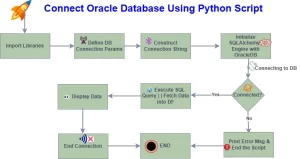
Top 10 Oracle SQL Query Every Oracle Professional should know
Oracle continues to lead in enterprise databases, but the future is shifting fast. With autonomous databases, AI-driven optimization, and hybrid cloud deployments, your SQL skills must evolve. These 10 SQL query will keep you sharp, efficient, and future-ready.
Table of Contents
Fetching Top N Records with Ranking
Recursive Queries for Hierarchies
Analytical Functions (LEAD, LAG, NTILE)
Dynamic SQL with EXECUTE IMMEDIATE
Materialized Views with Refresh
1. Fetching Top N Records with Ranking
Quickly identify top performers or highest values with rank functions.
SELECT *
FROM (
SELECT employee_name, sales_amount,
RANK() OVER (ORDER BY sales_amount DESC) AS rank
FROM sales_data
)
WHERE rank <= 5;
✅ Use Case: Dashboards, leaderboards, performance tracking
⚡ Pro Tip: For pagination, use ROW_NUMBER() with OFFSET for more control.
2. Recursive Queries for Hierarchies
Handle organizational charts or category trees with recursion.
SELECT employee_id, manager_id, LEVEL
FROM employees
CONNECT BY PRIOR employee_id = manager_id
START WITH manager_id IS NULL;
✅ Use Case: Org charts, nested categories
⚡ Pro Tip: In 19c+, explore WITH RECURSIVE for ANSI-standard recursion.
3. Pivoting and Unpivoting Data
Turn rows into columns (PIVOT) or reverse (UNPIVOT) in SQL.
SELECT *
FROM (
SELECT department, salary FROM employees
)
PIVOT (AVG(salary) FOR department IN ('HR','IT','Finance'));
✅ Use Case: Reports, analytics
⚡ Pro Tip: Combine with CUBE or ROLLUP for advanced aggregations.
4. Analytical Functions (LEAD, LAG, NTILE)
Compare rows across time with window functions.
SELECT employee_id, salary,
LAG(salary) OVER (ORDER BY hire_date) AS previous_salary
FROM employees;
✅ Use Case: Time-series, cohort analysis
⚡ Pro Tip: Use NTILE(4) to create performance quartiles for reviews.
5. MERGE (UPSERT) for Data Sync
Simplify ETL pipelines with one query for insert/update.
MERGE INTO target_table t
USING source_table s
ON (t.id = s.id)
WHEN MATCHED THEN UPDATE SET t.value = s.value
WHEN NOT MATCHED THEN INSERT (id, value) VALUES (s.id, s.value);
✅ Use Case: Data synchronization, migrations
⚡ Pro Tip: Always check indexes on ON columns for performance.
6. Querying JSON Data
Seamlessly query semi-structured data in Oracle.
SELECT JSON_VALUE(payload, '$.customer.name') AS customer_name
FROM orders
WHERE IS JSON(payload) = 'TRUE';
✅ Use Case: APIs, IoT, modern apps
⚡ Pro Tip: Use JSON_TABLE to flatten JSON into relational columns.
7. Dynamic SQL with EXECUTE IMMEDIATE
Automate and build queries dynamically in PL/SQL.
BEGIN
EXECUTE IMMEDIATE 'DROP TABLE temp_data';
END;
✅ Use Case: Automation, flexible procedures
⚡ Pro Tip: Use DBMS_ASSERT to prevent SQL injection in dynamic SQL.
8. Materialized Views with Refresh
Boost performance with precomputed summaries.
CREATE MATERIALIZED VIEW sales_summary
BUILD IMMEDIATE
REFRESH FAST ON COMMIT
AS SELECT region, SUM(sales) FROM sales_data GROUP BY region;
✅ Use Case: Dashboards, offline analytics
⚡ Pro Tip: Use partitioned materialized views for large datasets.
9. Querying Data Dictionary Views
Inspect schema and performance metadata.
SELECT table_name, num_rows
FROM all_tables
WHERE owner = 'HR';
✅ Use Case: Auditing, schema exploration
⚡ Pro Tip: Use DBA_HIST_SQLSTAT for historical query performance.
10. Performance Tuning with EXPLAIN PLAN
Diagnose slow queries with execution plans.
EXPLAIN PLAN FOR
SELECT * FROM orders WHERE order_date > SYSDATE - 30;
SELECT * FROM TABLE(DBMS_XPLAN.DISPLAY);
✅ Use Case: Query optimization
⚡ Pro Tip: Combine with AUTOTRACE in SQL Developer for instant analysis.
What’s Next in Oracle SQL (2025+)
- 🤖 AI-assisted query generation with Oracle Machine Learning
- 🌐 Cross-cloud querying with Oracle Database Service for Azure + OCI
- 🔗 Blockchain and graph tables for next-gen data models
Final Thoughts
SQL isn’t just a language—it’s a superpower. These queries are your 2026 toolkit for navigating Oracle’s evolving ecosystem. Bookmark them, practice them, and share them with your team.
💡 Have a favorite query or tip to share? Drop it in the comments below!



